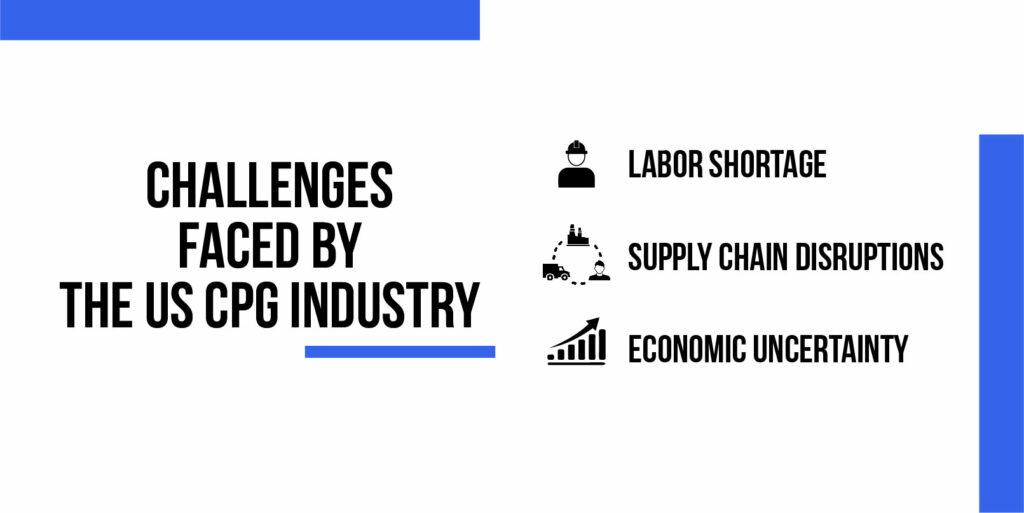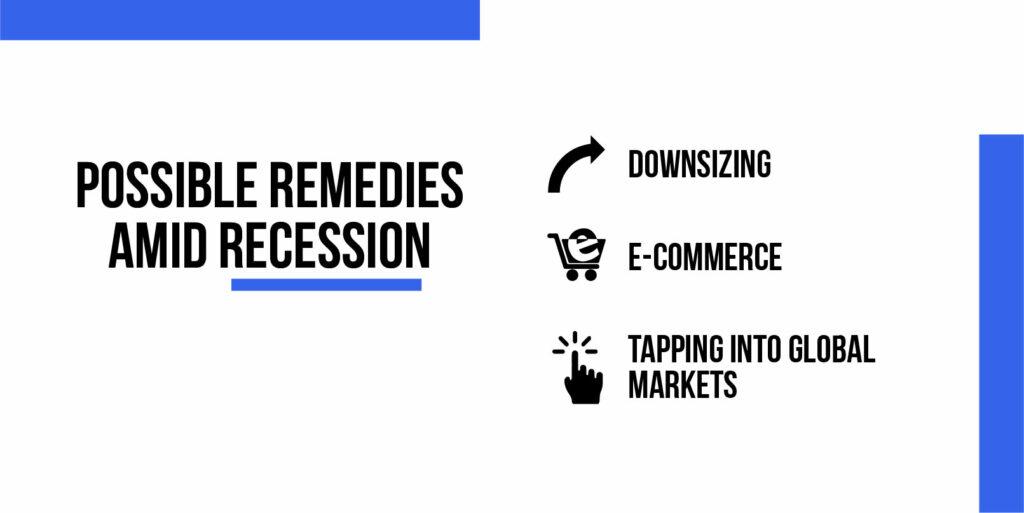The Covid-19 pandemic left the entire world in disarray. The sudden emergence of a global pandemic at an unprecedented scale caught the world by surprise, and the business landscape flipped upside down in a matter of weeks. The pandemic was the trigger that sent the global economy into a recessionary spell. While many industries and businesses suffered immense losses in these uncertain times marred by volatility, uncertainty, complexity and ambiguity, the damage to the US CPG industry was immense.
An earlier publication of Expertise Accelerated titled “Why Is Staff Augmentation Vital for US Companies Today?” quoted the US Chamber of Commerce stating that the Great Resignation in the US caused by the pandemic led to 47.4 million job acquittals since November 2020. It further states that the Great Reshuffle followed the Great Resignation, in which remote staffers emerged in the IT and Finance sectors in large numbers.
CNBC reports that the restaurant sector of the food and beverage industry suffered an immense setback, with CPG accounting experts estimating six years of growth being wiped out in a year. Over 100,000 restaurants had to close down within the first year of this recession. As if the pandemic was not enough, the tense geo-political climate of the world further drove inflation. Rising gas prices led to immense supply chain disruptions, and the food and beverage industry is still recovering from this whirlwind of unfortunate events.
Even in the final quarter of 2022, the economy continues to fluctuate drastically, and inflation is at an all-time high in these tumultuous times. This is not the first recession the world has gone through, and if the US CPG industry plays its card right, it can emerge out of this crisis stronger than ever.
Challenges faced by the US CPG industry

Labor Shortage
One of the greatest challenges to the US CPG industry in this recession is the labor shortage that has persisted ever since the pandemic began. According to a report by Business Insider, 6.9% of the food services workforce quit in just November of last year. This staggering loss of workforce due to social distancing and lockdowns left the industry without the manpower required to sustain its operations. Small businesses such as family-owned retail stores and restaurants were the worst hit.
Supply chain disruptions
The global supply chain suffered massive disruptions and delays, primarily due to restrictions on domestic and international trade leading to rising prices of materials and fuel. The White House released a detailed article titled “Why the Pandemic Has Disrupted Supply Chains”, highlighting that approximately 50% of the US CPG industry faced supply chain delays.
Disruption in the supply chain means empty shelves in stores and inflated prices of goods available, ultimately ending with many businesses having to close their doors permanently due to dwindling profits and shortage of supplies. Food distribution took an especially bad hit, with many food products expiring before they even hit the shelves of a store. Larger companies managed to weather the supply chain disruptions better compared to small businesses, but they, too, were on the suffering end..
Economic uncertainty
Perhaps the most subtle but herculean challenge to overcome for the US CPG industry in these volatile economic times is an uncertain future. With volatility and uncertainty growing with every passing day, the window of visibility is shrinking for the companies, and, hence, their ability to forecast and project financial outcomes is becoming more and more restricted.
Bigger companies like Nestlé have the resources necessary to cope up with the uncertain economic and financial climate and navigate safely into the future, but the accounting costs for small businesses left them vulnerable.
Possible remedies amid recession

Downsizing
Almost every business in the US CPG industry dealt with the many issues caused by the recession through strategic downsizing. Downsizing essentially implies trimming down the workforce and optimizing the business processes as much as possible to operate within the shrinking budget. This may also include decreasing the amount of inventory held, and even shutting down some operations such as accounting, as accounting costs for small businesses are unsustainable
While downsizing seems an abrupt solution, it is sometimes needed to keep the business going. A business can always upscale when times are better, but not downsizing when required can cause irrecoverable damage.
E-commerce
While the pandemic certainly hit retail businesses and brick-and-mortar establishments hard, it ended up scaling the e-commerce model of business up at the same time. E-commerce saw a boom amid the pandemic, and many businesses successfully managed to make it through the restrictive lockdowns by providing online ordering and home delivery services. Specialized agencies such as small business accounting firms also popped up to help businesses build a remote workforce. This paired nicely with the downsizing that businesses had to undergo and led to fruitful outcomes for the industry.
Tapping into global markets
According to CPG accounting experts, one of the key ways in which major companies like Coca-Cola dealt with past recessions was through tapping into global markets. While this is a remedy many businesses in the industry cannot accommodate, medium-to-large sized businesses have a great opportunity to capitalize on the multinational market. This is primarily because of the deep impact inflation has on the purchasing power of the nation. By leveraging relatively stable foreign economies, the US CPG industry can recuperate their losses at the domestic level.
Expertise Accelerated’s cost optimization doctrine
While there are many possible remedies to help deal with the adversities of recession, Expertise Accelerated’s cost optimization doctrine is a proven US CPG method to stay competitive amid recessionary pressure. Expertise Accelerated leverages onshore expertise with offshore talent to deliver quality-assured 60 percent payroll savings to US SMEs, hence, helping them deal with labor shortage and inflationary push in the cost of production.
Expertise Accelerated is led by Haroon Jafree (CPA), who is a turnaround expert specializing in cost optimization, process efficiency, and trade spend management.
EA’s Connecticut-based team leads the engagement to identify areas of potential optimization and advises process reengineering initiatives. On the sidelines, EA recruits high-quality accounting & finance, and supply chain professionals from its global talent pool and trains them for client-specific roles to implement these solutions.
In this way, EA clients receive trained remote professionals in areas of accounting & finance and supply chain that are professionally comparable or even superior but cost merely 40 percent of their US counterparts. Our clients have widely acknowledged the professional excellence and payroll savings that came with EA’s trained remote professionals.



